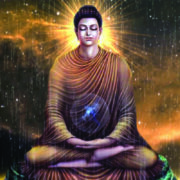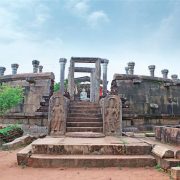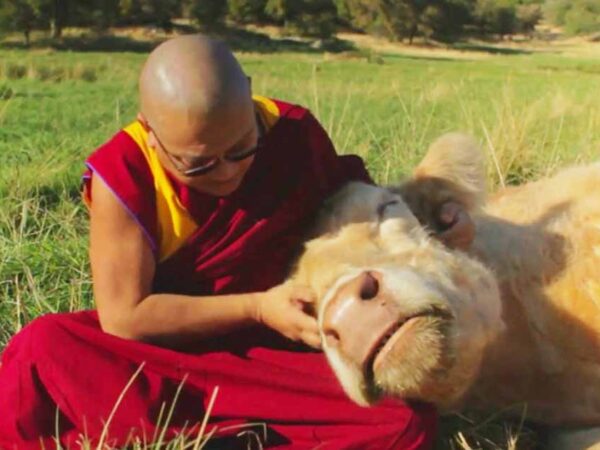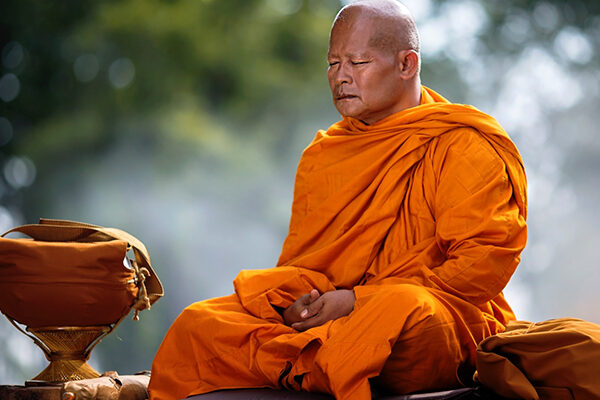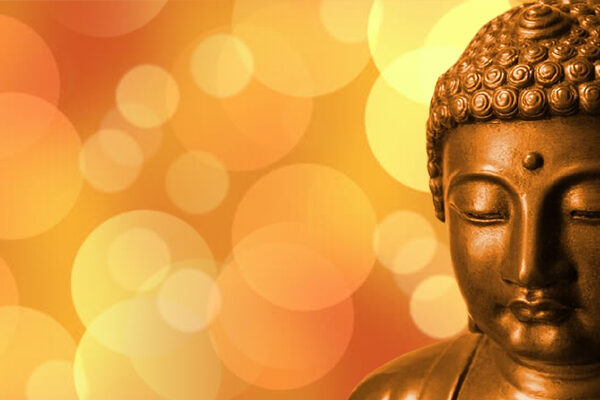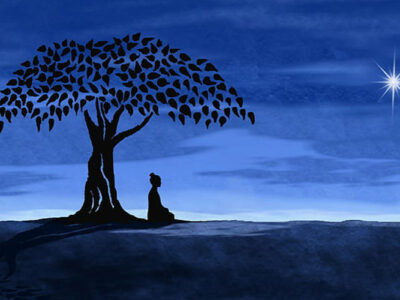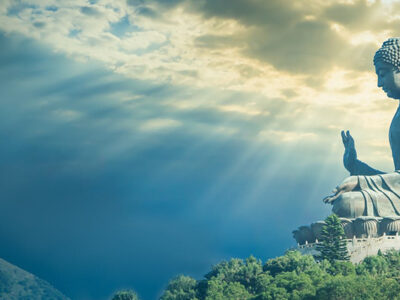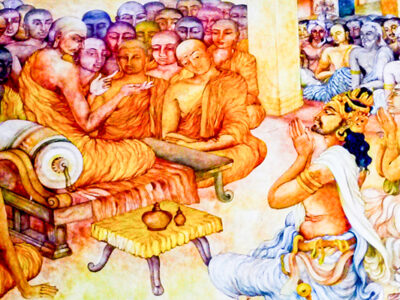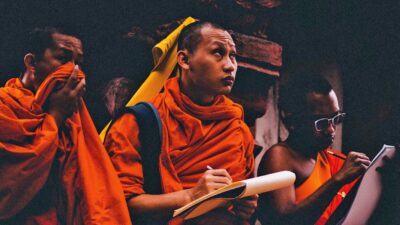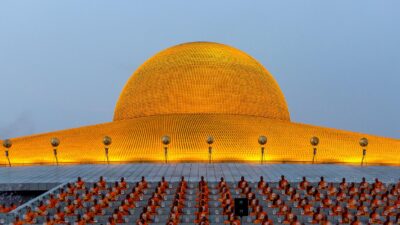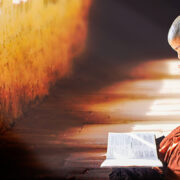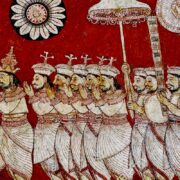Desire is the main cause of suffering and that could be ended by Right Living. (Buddha)
In the Life of the Buddha. While he was still Prince Gautama and had not yet attained Buddhahood, he led a sheltered life in the palace of his father, the King, and knew no suffering. He had everything a man could want of earthly pleasures. But feeling that there was something that he must be missing, he one day decided to slip out of the palace unnoticed and tour the countryside in his chariot. Some one guessed his intention and told the King who hastily had all signs of dirt, poverty and diseases swept away and garlands and flags hung out of every window, while all beggars, sick people and aged ones were safely stowed out of sight; for he particularly did not want his son to see anything that might distress him and make him want to leave the palace.
Despite these precautions, an aged beggar wandered into the path of the prince’s chariot, and Gautama saw an old man. Then he realized that this was something that must one day come to all including himself and that his present existence was an illusion and could not last.
Three more times he stole out of the palace on a similar escapade, each time his plan being betrayed to the King, who made unsuccessful attempts to ensure that he should see only beauty and happiness. Yet on the second excursion he saw a man so sick he was almost a skeleton and too weak to raise himself on the third he ran into a funeral procession and was brought face to face with death, and on the fourth trip he met a mendicant monk.
Old age, disease and death, he now realized were the lot of all men and might of any time come upon himself as indeed they did some fifty years later. It was the monk. However, who gave him the idea of his purpose to give up the pleasures of his palace, his royal position and to learn about another side of life.
Some of us never know anything about a second side of life. We live a humdrum existence in the land in which we are born. We never see how other people live. We may not even know anything about the lives of people of different social levels from ourselves or of lessor or greater wealth. If we are healthy we cannot know what it is like to be sick and if we are invalids we cannot understand the energy of the strong.
Such lack of experience makes for intolerance, because tolerance is a born only of understanding and without experience there can be no understanding. Hence it is a good thing for us to get as wide an experience as is possible of all sides of life, and especially to travel and let us make sure we do not always travel in luxury ?
So Prince Gautama, after some 29 years of soft beds, silk clothes, food of the very best and plenty of it, guards to protect him and the companionship of friends, dressed in a single robe, set out with no knowledge of where he would sleep that night, with no knowledge of where he would sleep that night, with no companion at first and with no food except what people gave him. And he admits that the first time he came to eat from the contents of his begging bowl, he vomited at the sight of the repulsive mess, for he had been used to dainties served on fine linen and golden platters. He was indeed human!
But thus he came to share the whole of human experience and to realise to the full the pain and suffering of the world pain. He learned not only from his beggar’s life but from following for a time the way of mendicants who torment their bodies in order, so they hope, to develop their spirit.
He realized that Desire was at the root of all suffering and that it could be ended by Right Living and that this was the purpose of man, because lack of Desire and Right Living led to Enlightenment as indeed, it had just occurred with himself. He was now the Buddha! So can anyone become a Buddha, if he strives hard enough (and long enough over enough lives… even you and I.)
All our mental suffering is based on Desire. Think about it and you will see that it is so. Desire to be what we are not to have what we have not, not to have what we do have, that others should not have what they have and so on. What is fear but desire to avoid ? Envy but desire to have ? Jealously but desire that others shall not have ? Grief but desire to regain someone ? Resentment but desire to be even with someone ? You can work out all the negative emotions in terms of Desire. Desires and Emotions are the shackles that hold us down.
Moreover, our mental states tend to affect our health and can produce diseases, or rather can admit the entry of germs into the body through what is known to doctors as ‘lowered resistance’ but they do not understand the nature of it. So negative emotions can really be blamed for our diseases … or for a good many of them.
Pain is either deliberate or accidental. If deliberate it is through the evil-mindedness of other : if accidental, then it is due to our own unpurified minds. “How?” do you ask in surprise. The accidents that befall you occurred because of your own nature, you attract certain types of events to yourself and lo! The accident happens.
Psychologists have a name “accident – prone” for a certain type of person, one to whom accidents seem to occur more often than to most people. But we are prone also to accidents of one kind of another, according to our natures. If you are a dare-devil you will be falling and hurting yourself from climbing dangerous places. If you are absent minded you become the victim of your own carelessness. If you are afraid of things, those things of which you are most afraid will happen to you.
So the Buddha was right even in the eyes of modern science when he taught that the way to end suffering was by following the Eightfold Path. This Path will clean up your mind and fill it with the sort of ideas that will help you to evolve. After having thrown out the things that are now hindering you.
But above all, be kind ! Remember, pain is a dreadful thing and we must have suffered ourselves to know it. The most callous doctors, medical students and nurses are those who have never had an operation. Even if you only suffered a little pain, try and imagine what the pain of any man or animal you see suffering is like. Try to put yourself in his place. Then you will have no desire to laugh. You will begin. Perhaps, to feel instead the first movings of that compassion for which the Buddha is renowned, and for which reason he has sometimes been called the compassionate Buddha.
The Buddha sees suffering as suffering, and happiness as happiness, and explains that all cosmic pleasure like all other conditional things, is evanescent is a passing show. He warns that they sooner or later beget discontent. Equanimity is the best antidote for both pessimism and optimism. Equanimity is evenness of mind and not sullen indifference. It is the result of a calm, concentrated mind. It is hard, indeed. To be undisturbed when touched by the vicissitudes of life, but the man who cultivates equanimity is not upset.
The Buddha made no pretense of offering stability in the unstable. For the reason some people call him a pessimist, just as a child who has built a sand-castle will regard as pessimistic any prediction of its dissolution. But the Buddha did offer people something infinitely better than the stability they foolishly seek in unstable phenomena. He offered them a method to attain ultimate stability. In that which is eternally stable and secure. He said, in effect. “Do not imagine there is a soul that is permanent in body or mind. That is a road of anxiety and suffering. See these merely, as changing phenomena and work for that which does not change.” If we remember this message in our daily lives. We will have taken a big step in the right direction. We may not attain Nibbana here and now, but we will at least realize that there is no substitute for Nibbana, and we will worry less about the unstable environment in which we live.
Apart from the fact that all worldly conditions are unsatisfactory (dukkha), this general discontent among the educated classes is mainly due to lack of proper training in the Buddhist Way of Life. Many of us do not know it at all, or even if we know it, we habitually fail to apply it to our everyday life. In our ignorance we blame the government and everybody else except ourselves, and yet, as Buddhists we ought to know that we too are to be blamed for our real or imaginary misery.
“Come here, O Brethren, walk in light to make an end of all suffering!
He gave utterance to certain maxims, and they thought that by following these blindly they can find happiness. It is much easier to do so; to follow a certain rule blindly, instead of cultivating knowledge to make oneself a slave instead of being free. They took a half-truth and made a falsehood of it. They built the spire while the foundation crumbled.
“Buddha taught that all man’s unhappiness comes from wanting the wrong sort of things the pleasures that money can buy, power over other men, and most important of all, to go on living forever after one is dead. The desire for these things makes people selfish, he said, so that they come to think only of themselves, want things only for themselves, and not mind over much what happens to other people. And since they do not get all their wishes, they are restless and discontented. The only way to avoid this restlessness is to get rid of the desires that cause it. This is very difficult, but when a man achieves it, he reaches a state of perfection and calm.
Sorrow follows man like this shadow and goes with him along the pathway of life. The existence of a man begins with weakness, which is sorrow in childhood the reins of duty bring sorrow; in the prime of manhood the ceaseless strife of achieving a living for self and family brings sorrow; in the declining years are sickness, weakness, dependency, suffering and death, “Such O Breathren,” said the Buddha. “is the round of existence”. The stirring of the passions, the lust of hate and envy, the thirst for power, the pride inself in the harvest of years, all these are barren in the winter of old age!
Some forms of suffering are the mere result of being a living organism. They are the price we pay for our existence in Samsara, the condition brought on by our craving. So we can never tell precisely whether a particular affliction in the result of past kamma or not. In any case, even a disease which has kamma for its principal cause must also depend to a certain extent on physical conditions to bring it about. If that were not so, Buddhism would have no use for medicine or surgery. But on the contrary, we should regard every disease as being possibly curable, so long as there is life in the patient. If it is caused by Kamma, we cannot tell at what point the bad results may come to an end and the patient recover. Many people have lived to a ripe age after having been given only a few months of life by their doctors. It would be a mistake to blame the doctors for such apparent errors ; their prognosis may have been perfectly correct, by all the clinical evidence available at the time they made it. Yet cases have been known in which the most incredible physical restorations have come about quite naturally, after the patient has been given up for lost.
The cosmos is indifferent to human suffering, and it is sheer folly to expect security or eternal happiness while one sojourns in a cosmos subject to constant change. All along it is suffering. Therefore, detachment is the only way to put an end to suffering.
WHO SUFFERS AND WHY ?
Here in the following discourse the Buddha has given various reasons of the suffering or the downfall of men.
Pain is the weal in Life.
Pain is the suffering
Prospers who Dharma loves,
Suffers who Dharma hates.
Who hath bad men as friends,
Nor maketh friends with good,
Who chooseth men’s bad ways’
A source of suffering that.
When man loves company,
And sleep when he is lax
And slack and known for wrath;
A source of suffering that.


